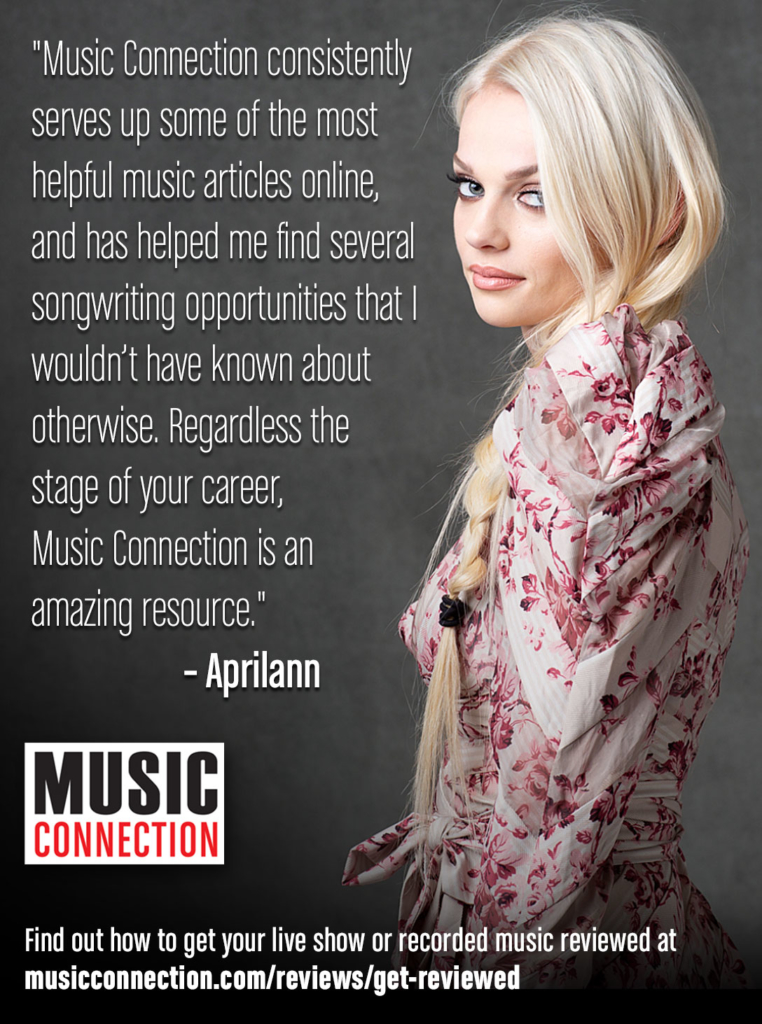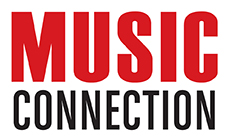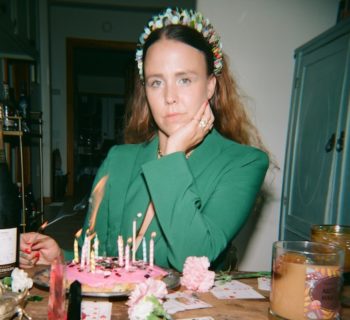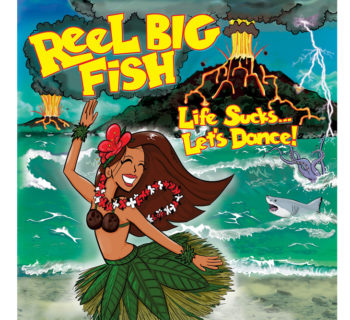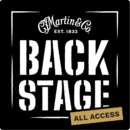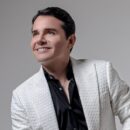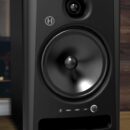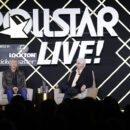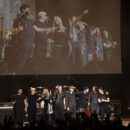SOMETHING FOR THE BAND WITH EVERYTHING
Photos by Munachi Osegbu
Just a few years ago, being a Sparks fan was like being in a cult. Like Jonestown without the Kool-Aid and mass suicide, Sparks attracted different types of fans for different reasons. It depended on when (as in what period of their long and increasingly illustrious career) and where (as in the geographic location ranging from couldn’t get arrested to being all the rage) the listener discovered them, but once initiated, Sparks was everything to all of them.
The Los Angeles born and raised, UCLA-schooled brothers Ron and Russell Mael were discovered by Todd Rundgren (with whom they still collaborate, just check his last album for “My Fandango”), who in 1972 signed them to the Bearsville label where they put out two records that didn’t exactly make them hometown heroes. Maybe their Cali flavors of post-Beach Boys meets Zappa-adjacent avant-garde meets their Anglophile love of post-British Invasion power pop/psychedelia was too quirky? So, they fled failure and anonymity, went across the Pond, and Being There’d their way into the U.K. glam/glitter scene of Marc Bolan/T-Rex, Sweet, Slade, Queen (and according to MOJO magazine, tried to poach Brian May) and experienced their own version of a Ziggy-meets-Bay City Rollers mania. This is why, back home in L.A., fanatics like Jane Wiedlin of The Go-Go’s, and so many others, thought they were a British band when she established her own Sparks fan club. (A few years later she’d be singing “Cool Places” with them.)
Sparks’ glitter period is also when future punk rockers like Steve Jones of the Sex Pistols and Siouxsie Sioux of the Banshees fell in love with them. The brothers’ euro-disco/proto-trance/synth-pop records would, uh, spark Joy Division and Depeche Mode and Pet Shop Boys and Duran Duran and a slew of other Second British Invasion bands. Next, their sojourn in France obviously captivated a young Daft Punk, Air, and they gave hit songs to national favorites, Les Rita Mitsouko. Actually, like Bowie, each of their incarnations yielded another groundswell of future groundbreakers and hitmakers to the point where their impact on rock and pop music is almost incalculable. It’s as if the number of bands Sparks’ve incited outnumbers the people who have even heard of them.
And the inspiration has never stopped, they surpassed 50 years of their family business as each decade begat new disciples. There is something Rundgren-ish or Zappa-esque about them. On the one hand, an acquired taste, but also so catchy they’re too infectious to dismiss. Yes, they’ve been different things to different people, but more and more they are all things to an increasingly larger group of people who have become obsessed completists. And that probably has much to do with the wild success of Edgar Wright’s 2021 documentary, The Sparks Brothers, where the director was, almost miraculously, able to celebrate the Maels’ eccentricities while emphasizing their accessibility and ubiquity.
Sparks are not nostalgic, they don’t look back at milestones and accolades. In fact, they are still outdoing themselves at a rate that can almost make them blush. They have wowed audiences at Cannes with their musical film, Annette, and are now back with their 25th album, a serving of art-pop perfection, The Girl Is Crying in Her Latte, the video for the title track featuring Oscar winner and Sparks fan, Cate Blanchett. This month Sparks embark on a world tour which sees them playing prestigious venues like the Royal Albert Hall in the U.K. and the Hollywood Bowl in Los Angeles where they will, undoubtedly, be greeted as the hometown heroes they always were. Who knows, maybe a Rock and Roll Hall of Fame induction isn’t too much to ask for next?
Music Connection: The Girl is Crying in Her Latte offers new palettes of sounds. Can you talk about how discovering new toys, new gear, new software, new plug-ins, etc. yields new works for Sparks?
Ron Mael: We don’t have to worry about the clock and the time in the studio, because it’s our own time, our own place. Also, we are able to accumulate new sounds through software. In some circumstances we still write the songs in a traditional way–you know, piano and singing–but we are also writing it from an inspiration, from a sound, or something with new software. Russell in particular is always seeking out new software, and it isn’t only to just color a thing after the fact; sometimes it’s something that will inspire you to actually create something new.
Russell Mael: The most important thing is the song. We had a small studio set up in my place, but we were always dependent on an engineer to come in and use it. At a certain point I thought, I have this equipment sitting here, I should learn how to use it. Over time, I became more self-sufficient, and I became more interested in what’s out there sonically. There’s lots of companies now that have amazing software and sound libraries in all different styles. There are amazing orchestral and synthesizer libraries.
We’re not purists, either, with synthesizers. We don’t think in terms like “Oh, I’m going analog.” If you can get a sound that is virtually indistinguishable from the hardware version of an instrument, then we don’t see that as cheating. Sonically, when you have to be so purist as to say that it has to be coming from a real Moog as opposed to a real Moog that has been sampled to be used for software, then it becomes a real strange argument as to what is really necessary or better. Also, it’s how you use any of that stuff, whether it’s hardware or software. Because I know some bands using great vintage gear, and in the end it’s “eh uh eh uh” and you go, “Okay, it’s vintage, but so what?”
Ron: We’ve kept a lot of those old pieces of equipment just because they’re cool. We have the RMI [Electra-Piano] and the Echoplex that we used on the recordings of the first island albums, Kimono My House and Propaganda, and then we have the Roland Jupiter 8’s and the early drum machines, just because you hate to get rid of that stuff, it’s so beautiful and cool. But we like to work fast, and you know there’s tuning and reliability and space issues that makes us think, “Let’s just save those for the museum tour.”
MC: You’re not hung up on nostalgia, sometimes performing an entire new album before offering the greatest hits. Many bands are afraid of losing the audience to the bathroom break, but it’s like you have the confidence to say, “This is what we’re doing now, come along or get left behind.”
Russell: We agree totally. If you are shying away from your new material, then there must be some issue with it. There are obviously certain songs that we want to do from the past, that fans expect and enjoy, but we like to balance that with what we are doing now because we’re proud of our new material. I think people come away from Sparks shows, especially new or younger fans who don’t have a reference point of the past, as all of a piece. As opposed to, “Oh I want to hear songs from…” whatever golden era they may think is Sparks’ golden era.
MC: It’s obvious that the success of Edgar Wright’s The Sparks Brothers doc made the tent bigger for people with no previous reference/access point?
Russell: He kind of emphasized that Sparks’ history is equally valid throughout our entire career. That there are even albums that went under the radar, but now when you go back to inspect those albums, there were circumstances as to why they were under the radar, as opposed to quality issues. And now we even enjoy doing some of the more obscure songs live, because now in the context of a whole show people have even more difficulty distinguishing what period something is from, because it all sounds like it’s of a piece.
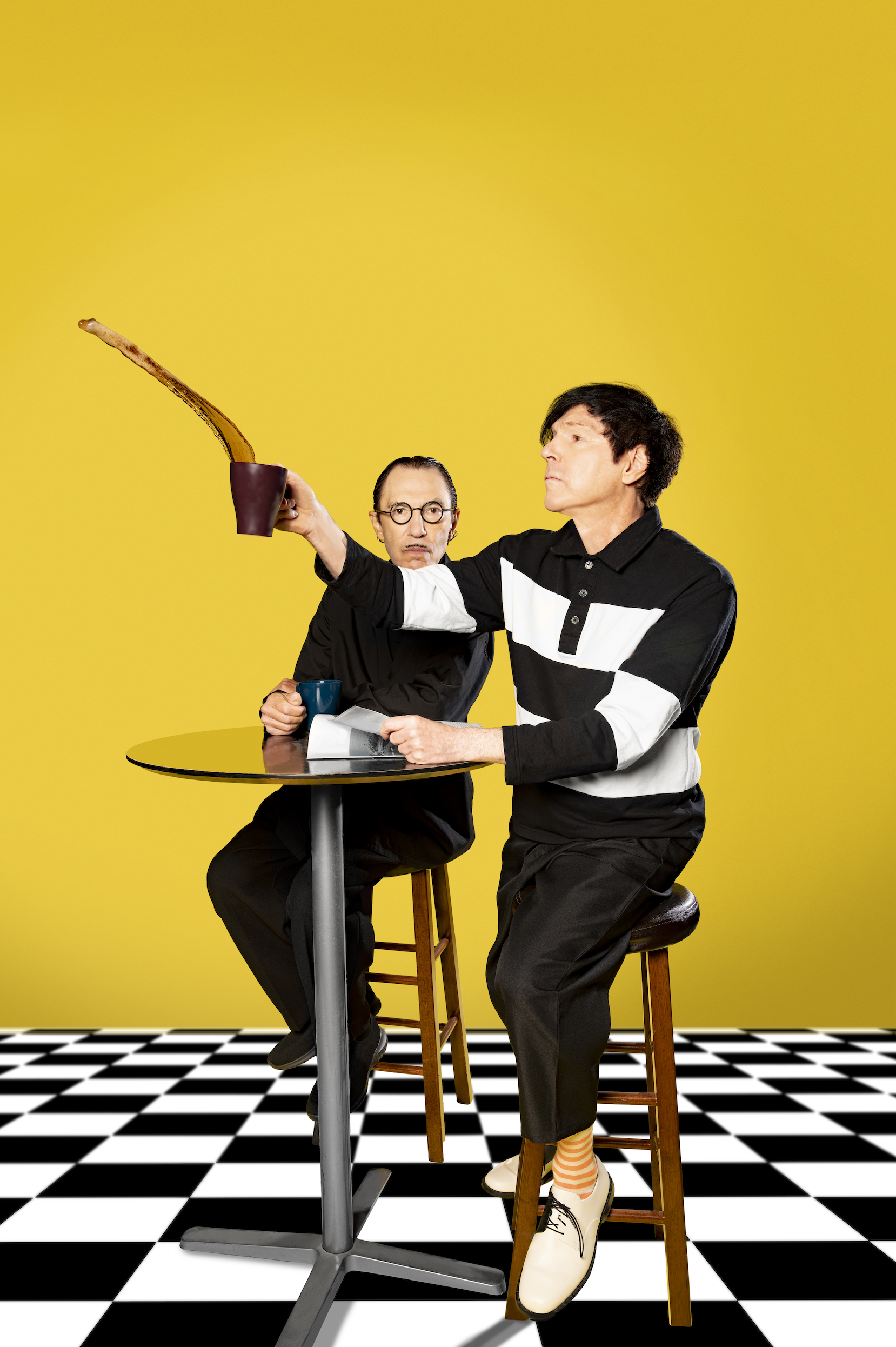
MC: In a very Bowie-like way you have many incarnations, which at first glance can seem drastic and incongruent, but there’s stuff on the new album that still evokes your first record, so can you talk about that throughline?
Ron: We are fortunate enough that through all things where we kind of soaked up influences, our sensibilities are strong enough, that it’s always going to be us. For better or worse, it’s always going to be the Sparks sensibility in whatever we do, so we’re not afraid of moving in a different direction where we ever lose our way, because we know that the way we think of music and lyrics is always going to be there, in a general sense, and those other things are just a shell around all of those things that we are.
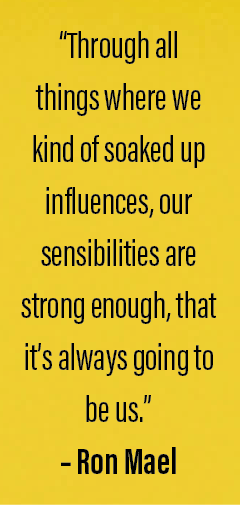
MC: Can you talk about the astounding feat of performing 21 albums in 21 nights that you did in England back in 2008?
Russell: It was something that our manager Sue [Harris] had the audacity to come up with. The concept that was “What could you do for the release of the next album?” Which was Exotic Creatures from the Deep, our 21st album. So, she thought of this idea, what if you do every one of your albums from start to finish—and in order—as kind of a statement. At first, we said, “Oh yeah, it sounds real cool,” but then we got down to the brass tacks about how we were actually going to do that.
We ended up rehearsing for four months to do those shows, but it’s something we think was an amazing achievement that no other band will ever do—or that even has that many albums—because the amount of focus that you have to have to do that is pretty intense. It was a really special event, and was also a great leveler, in a way: when you hear all those songs done live, taken away from their recorded versions, it does become like it’s all of a piece, and you see how some albums have slipped by at the time. We thought some of those albums were lesser, just because they didn’t have a massive hit off them, but we heard them again and thought, “There’s nothing wrong with this album at all!” And the people who came to all those shows kind of realized the same thing. There are songs on albums like Introducing Sparks that went under the radar at the time.
MC: You are with a major label again, Island Records, but have been operating for years as something like The House of Sparks, a boutique production company putting out high-end, curated music, videos, films, collectables, apparel and other merch with a fierce DIY spirit. Can you enlighten us about taking control of your art and brand.
Russell: In the end, it’s always the first choice to control and present what you’re doing 100 percent the way you want to present it. We, along with Sue our manager, have a pure vision of what Sparks is and should be, and that way you can have things in your own hands. The downside is that sometimes you might not have the infrastructure to get it out to the rest of the world in the way, let’s say, that Island or Universal can do, with their reach. But as far as the actual material that you have and the way you present it, from the packaging and even the videos that we ended up doing on our own, there’s something to be said for having your own autonomy. Then your fate is in your own hands, and it’s something that you can be proud of. Having to be dependent on huge budgets to be able to move is paralyzing, so if you can avoid that there are more ways to work in the music field.
MC: Sparks also has an impressive social media presence, yes?
Ron: You have to be active in giving people things. Even if it’s not your music. Something. During the pandemic, for better or worse, once a week I did a reading of a song lyric. It wasn’t like we had 10 million people watching it, but it’s trying to maintain a connection with people in a non-traditional way. We are always aware of making albums in the same way that we made albums all through the time, but there has been a huge change in the way that people hear things, and you have to be aware of that and adapt to it.
MC: Can you talk about signing with Island again after so many years?
Russell: It’s pretty amazing that we signed with Island, who signed Sparks for what became Kimono My House in 1974, the album that really put us on the international scene. They signed a band that was uncompromising in 1974, and now, getting close to a half-century later, they signed Sparks again. But it wasn’t based on nostalgia or “Weren’t they wonderful? Wouldn’t it be nice to have their name around our label?” They responded to what Sparks is doing now musically, and they really love the new album, and that, for us, makes the whole story of being back with Island the most satisfying. It’s that they see the same spirit and adventure that Sparks had in ‘74 now applied in a fresh and new way in 2023 on the new album, so I think it is an amazing story to be back with them.
MC: Sparks will play the historic Hollywood Bowl in July. As born-and-raised Angelinos, how does it feel to play such a large, legendary venue?
Russell: Touring has been going up and up for Sparks in the last several years because of this real awareness of the band, due in large part to Edgar Wright and the documentary. And the Annette film was well received around the world. We’ve been able to play to bigger and bigger audiences, so now to be able to play the Hollywood Bowl, especially being from Los Angeles. . . it’s the most iconic venue you can possibly play in L.A., so we’re really excited about that.
MC: This may be more of an observation, but I’ve noticed about how in the beginning Sparks was a music group that dabbled in art, but by now you’ve become a complete art project that uses music as the vehicle. You are more than a band, you are art.
Ron: When we first started off, we were attempting to emulate bands like The Who and The Kinks, bands that were bands, but ones that had a theatricality that wasn’t present in the L.A. bands. The personalities of the people in the bands gave it a theatricality that’s only there in rock music. Through the years we’ve always felt that the visual side of things is something that is incredibly important. It doesn’t diminish what we were doing musically; to us it’s all part of a piece.
We’ve always been aware that what we’re doing is not just a traditional rock band, and that we are kinda both in and out of the role of rock musicians. But we’re not doing music from a distance, I mean, we’re totally invested in the kind of music that we like, and we can’t really work in a way that isn’t in some way at least adjacent to rock and pop. We are also aware that we bring additional elements to what we’re doing. You don’t have to be one thing, and that sometimes it causes problems as far as some critics being unable to pigeonhole us with, “What is it?” or “I don’t get it.”
MC: I’ve heard you talk about being dada, and I see you like musical dada. And with your obsession with cinema, I also see you as being musical cinema, does that make sense?
Ron: We kind of see the songs when we write them in a cinematic way. That doesn’t mean you’re using soundtrack sounds or anything, but they are cinematic in that they are somehow larger than life, and we always felt that that was an essential part of the bands we always started off really admiring early on, and hoping we could kind of continue in that tradition.
MC: Russell?...
Russell: Ditto. Everything he said.
Contact Ken Weinstein, Big Hassle Media
Visit allsparks.com; bighassle.com
